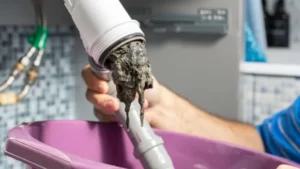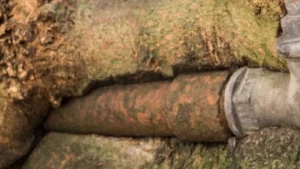Drain blockages can be a frustrating and messy problem to deal with. They can disrupt your household’s or commercial space’s smooth functioning, leading to unpleasant odors, slow drainage, and even potential structural damage. Understanding the common causes of drain blockages is essential to prevent them from occurring in the first place. This blog post will explore the top five causes of drain blockages and provide practical tips to avoid them. By following these preventive measures, you can maintain a clean and efficient drainage system.
Grease and Fat Buildup
One of the main culprits behind drain blockages is the accumulation of grease and fat. When oils, fats, and greasy substances are poured down the drain, they solidify and cling to the inner surfaces of pipes. Over time, this buildup hampers the water flow and eventually leads to clogs. To prevent this issue, it is crucial to dispose of grease and fat properly. It is highly recommended to allow them to cool and solidify before scraping them into a sealable container and disposing of them in the trash.
Another effective solution is to install a grease trap, which can intercept grease and prevent it from entering the drainage system, significantly reducing the risk of blockages and costly repairs. In addition to grease and fat, other common causes of drain blockages include hair, soap scum, food particles, and foreign objects. Regular maintenance, such as using drain filters or screens, can help prevent these items from entering the drains in the first place.
It is also important to avoid flushing non-biodegradable items down the toilet or pouring chemicals that could corrode or damage the pipes. If a blockage does occur, it is best to address it promptly by using a plunger or a drain snake to remove the obstruction. In more severe cases, professional assistance may be necessary to clear the blockage and restore proper drainage function fully. By being mindful of what goes down your drains and taking proactive measures to prevent blockages, you can maintain healthy plumbing systems and avoid costly repairs in the long run.

Hair and Soap Residue
Drain blockages are common, especially in bathroom drains, and are often caused by the accumulation of hair and soap residue. When hair gets trapped in the drain, it combines with soap scum to form stubborn clogs that impede water flow. To prevent this problem, it is advisable to use a drain cover or hair strainer in your shower or bathtub to catch loose hair before it enters the drain. Regularly cleaning the drain cover or strainer by removing the collected hair is essential to ensure proper drainage.
Additionally, hair-catching devices can help prevent lint and fibers from causing drain blockages for washing machines. By implementing these preventive measures, you can maintain clear and efficient drains in your bathroom and avoid the inconvenience of dealing with clogs in the future. In addition to using drain covers and hair strainers, you can take other preventative steps to keep your drains clear. Avoid pouring grease or oil down the drain, as they can solidify and create blockages.
Similarly, be mindful of what you flush down the toilet, as items like wet wipes and sanitary products can cause significant plumbing issues. If you encounter a stubborn clog despite taking preventive measures, it is best to avoid using harsh chemicals as they can damage your pipes over time. Instead, gently remove the obstruction by using natural remedies such as a mixture of baking soda and vinegar or a drain snake. Regular maintenance is key when it comes to ensuring proper drainage. Consider scheduling routine inspections by a professional plumber who can identify potential issues before they become significant problems.
Foreign Objects
One of the leading causes of drain blockages is the presence of foreign objects, such as toiletries, sanitary products, and children’s toys. Accidentally flushing or discarding these items down the drain can result in significant obstructions. To prevent such issues, educating everyone in your household or workplace about what should not be flushed or disposed of in drains is vital. To encourage proper disposal practices, consider placing trash bins conveniently in bathrooms and regularly reminding family members or colleagues to dispose of non-biodegradable items correctly. By doing so, you can contribute to maintaining clean and unclogged drains. In addition to promoting proper disposal habits, regular maintenance practices like drain cleaning and inspections are crucial.
These practices can help identify potential blockages before they escalate into significant problems, ensuring the longevity and efficiency of your drainage system. If you experience a drain blockage despite preventive measures, it is advisable to call a professional plumber specializing in drain cleaning. They have the tools and expertise to clear even the most stubborn blockages effectively and safely. Remember that attempting to fix a severe blockage on your own may worsen the problem or cause damage to your plumbing system. Adopting proactive measures like educating others about proper disposal practices, maintaining regular inspections, and seeking professional help when needed can go a long way in preventing drain blockages and ensuring a smoothly functioning drainage system.
Tree Roots
The instinct of tree roots to seek out moisture and nutrients can sometimes lead them to infiltrate underground drainage pipes, causing blockages and damage. If you have trees near your property, you must be aware of the potential risk their roots may pose to your drains. Regular inspections by professional plumbers can help detect root intrusion early on, allowing for prompt action. To prevent problems associated with root invasion, planting trees at a safe distance from drainage lines or choosing tree species with non-invasive root systems is recommended. Installing root barriers or using root-killing chemicals can also be effective preventive measures to protect your drainage system. By taking these precautions, you can preserve the integrity of your pipes and avoid costly repairs in the future. Tree roots are naturally attracted to water sources, so they often grow towards underground pipes that carry moisture.
When tree roots infiltrate drainage pipes, they can cause blockages and damage, leading to plumbing issues and costly repairs. Homeowners with trees near their property must be aware of this potential risk and take preventive measures. Regular inspections conducted by professional plumbers can help identify any root intrusion early on, ensuring timely action is taken. Planting trees a safe distance from drainage lines or selecting species with non-invasive root systems can significantly reduce the likelihood of root invasion. Installing root barriers or using root-killing chemicals can provide extra protection for your drainage system. By being proactive and taking these precautions, you can maintain the integrity of your pipes and avoid unnecessary expenses in the long run.

Accumulated Debris and Sediment
Outdoor drains, such as gutters and downspouts, are susceptible to blockages caused by the accumulation of debris like leaves, dirt, and sand. To prevent these blockages, cleaning and maintaining these drains regularly is crucial. Cleaning your gutters and downspouts at least once a season by removing any built-up leaves or debris is highly recommended.
Additionally, installing gutter guards or screens can serve as a preventive measure to keep debris out of the drainage system. Following these steps, you can ensure that your outdoor drains remain transparent and fully functional, safeguarding your property against potential water damage. Inspecting the drain pipes for any signs of damage or deterioration and addressing them promptly to maintain proper drainage is also essential.
Regular maintenance of outdoor drains is essential for preserving the integrity of your property’s drainage system and preventing costly repairs in the long run. Furthermore, consider investing in gutter extensions or splash blocks to redirect water away from your foundation. This will help prevent water from pooling around your home, which can lead to structural issues over time. Prevention is key in outdoor drain maintenance, so taking proactive measures will save you time and money.
Conclusion
In conclusion, being aware of the top five causes of drain blockages and taking preventive measures can save you from the hassle and expense of dealing with clogged drains. Clear Choice Drain Solutions in Braintree, MA, can assist you with any drain-related issues. You can maintain a straightforward and efficient drainage system by properly disposing of grease and fat, using drain covers and strainers, avoiding flushing foreign objects, taking precautions against tree root intrusion, and regularly cleaning out accumulated debris and sediment. Contact Clear Choice Drain Solutions today for expert assistance keeping your drains flowing smoothly.
